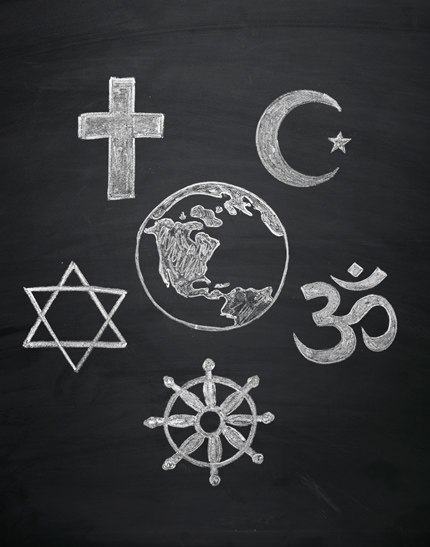The views expressed in our content reflect individual perspectives and do not represent the authoritative views of the Baha'i Faith.
When a fellow student asked what classes I planned to take the following semester at our junior college, I mentioned Comparative Religions.
He told me that when he had taken that course the instructor mocked the practices of some faiths, going so far as to preface one with, “Now this is really strange…”
Unsure whether or not he was exaggerating, I still chose a different teacher. In her initial address to the class, our professor, Nandini Iyer, told us we’d come to realize that the spiritual teachings of all religions are essentially the same. It is only the trappings, the rituals and practices that set them apart. I instantly knew I’d made the right choice, because the Baha’i teachings tell us:
The gift of God to this enlightened age is the knowledge of the oneness of mankind and of the fundamental oneness of religion. War shall cease between nations, and by the will of God the Most Great Peace shall come; the world will be seen as a new world, and all men will live as brothers.
…This is the desire of all noble natures; this is today the teaching for the East and for the West; therefore the East and the West will understand each other and reverence each other, and embrace like long-parted lovers who have found each other.
There is one God; mankind is one; the foundations of religion are one. Let us worship Him, and give praise for all His great Prophets and Messengers who have manifested His brightness and glory. – Abdu’l-Baha, from his essay in The Christian Commonwealth, Abdu’l-Baha in London, p. 19.
We also learned that the Golden Rule appears in all religions. The wording differs; but the meaning is the same:
Buddhism: “Hurt not others in ways that you yourself would find hurtful.”
Zoroastrianism: “That nature only is good when it shall not do unto another whatever is not good for its own self.”
Judaism: “What is hateful to you, do not to your fellow men. That is the entire Law, all the rest is commentary.”
Hinduism: “This is the sum of all true righteousness: deal with others as thou wouldst thyself be dealt by. Do nothing to thy neighbour which thou wouldst not have him do to thee after.”
Christianity: “As ye would that men should do to you, do ye also to them likewise.”
Islam: “No one of you is a believer until he desires for his brother that which he desires for himself.”
Confucianism: “Surely it is the maxim of loving-kindness: Do not unto others that you would not have them do unto you.”
Baha’i Faith: “He should not wish for others that which he doth not wish for himself, nor promise that which he doth not fulfill.”
 This continuity between all of the world’s major Faiths can teach us something—that all religions come from the same source. Baha’u’llah said that religion is one, and taught the concept of progressive revelation—that from age to age, God sends us a new messenger, a prophet, a manifestation of God, to renew religion.
This continuity between all of the world’s major Faiths can teach us something—that all religions come from the same source. Baha’u’llah said that religion is one, and taught the concept of progressive revelation—that from age to age, God sends us a new messenger, a prophet, a manifestation of God, to renew religion.
One helpful analogy is to think of the various Manifestations of God as teachers in the school of God. While progressing from grade to grade in secular schools, at the beginning of each new term, the new teacher doesn’t tell the students that what they learned before was wrong or that they shouldn’t believe what their last teacher taught them. Rather they spend time reviewing what had been learned previously, because it is the basis upon which their new lessons will be understood. They don’t learn that addition or subtraction are wrong or a waste of time. They need that knowledge in order to go on to multiplication and division, and after they learn those topics, they will eventually move on to learn algebra, calculus, etc. Your elementary school teachers may know the higher math forms, but they don’t teach it to their students because they aren’t ready to comprehend it.
What does change in each subsequent revelation are social laws—those that deal with marriage, divorce, diet, inheritance, and instructions for prayer and fasting. These can be quite different from one Faith to the next, and a close examination can help understand that they were right for the time in which they were issued. Spiritual laws, however, do not change–but they are progressive. If you look at the history of the Golden Rule, you’ll see that we’ve moved from “love thy neighbor” to “love thy neighbor as thyself.” In this new age we’re asked to “Beware lest ye prefer yourselves above your neighbors.”
If we’d all take to heart at least the injunction of the Golden Rule, we’d develop a happier world—if we were to “prefer” our neighbors, we could help bring about true peace on earth.
















Comments
Sign in or create an account
Continue with Googleor